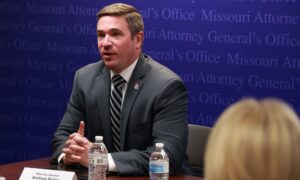8:00
News Story
Independence’s four-day school week draws Missouri auditor probe
Missouri Auditor Scott Fitzpatrick wants to audit more school districts without a citizen petition or accusation of wrongdoing. Independence is first on the list.
Independence School District Superintendent Dale Herl feels targeted by the state for moving to a four-day school week.
On Wednesday, Missouri Auditor Scott Fitzpatrick announced a plan to audit the district.
Independence schools aren’t accused of wrongdoing, and no one asked for an audit.
Rather, it’s Fitzpatrick’s first foray into conducting more routine audits of some of the state’s 518 school districts, something he promised during his campaign and inauguration.
Fitzpatrick initially said he wanted to investigate schools teaching about sexuality, gender or “critical race theory” — which has become a catchall term for race- or diversity-related concepts that parents or politicians may find objectionable. So far, he hasn’t emphasized that in the Independence audit.
“The combination of them being a large district that has a four-day week that’s in the Kansas City area was a big factor” in choosing to audit Independence, he said.
The auditor’s office has held expanded power to audit school districts for more than a decade, but has rarely used it. Fitzpatrick’s decision to flex that power comes as a bill further expanding the auditor’s authority to investigate other government bodies without an invitation awaits Gov. Mike Parson’s signature.
The formal announcement of the audit to the school board on May 14 came shortly after Parson signed legislation to require school districts in charter counties and cities over 30,000 in population to seek voter approval if they want a four-day school week.
Independence switched to a Tuesday-through-Friday schedule for the 2023-24 school year to better recruit teachers and other staff. Herl said it’s already been successful.
The law doesn’t affect most of the more than 150 districts in the state that, like Independence, switched to a four-day week, because most of them are rural.
But it requires Independence, by far the largest district in the state to go to a four-day week, to win voter approval or return to a five-day week.
The new law and the audit announcement come as Independence is wrapping up its first school year on the four-day schedule.
“It does feel like we were certainly targeted because we are (on) a four-day school week,” Herl said.
Making audits routine
The state auditor’s job is to check state agencies, circuit courts and local governments for waste, fraud and inefficiencies.
School districts are required to have regular financial audits, conducted by an independent auditor. But audits from the state typically look beyond finances and don’t follow a set schedule.
While the auditor has had expanded power to audit school districts since 2008, school audits have most frequently happened when citizens collect signatures to petition for an audit or in response to specific concerns.
Of six school district and charter school audits completed since 2019, half sprang from citizen petitions, two were requested by the Missouri Department of Elementary and Secondary Education and one was requested by a charter school’s board.
Older audit reports don’t always state why they were initiated, but Fitzpatrick said auditors have conducted an average of one to two school district audits a year since 2008.
The Beacon confirmed those numbers are accurate based on online audit reports when you leave out follow-up reports, charter school audits and higher education audits.
K-12 education is one of the state’s biggest expenses. Fitzpatrick said, “we spent almost none of our audit resources auditing the recipient of those funds.”
He wants routine audits of school districts to become more common and has been adding staff for that work.
“We are going to use more of our discretionary audit resources to do audits of school districts,” Fitzpatrick said. “The role that school districts play in preparing the next generation of Missourians for the workforce is incredibly important.”
Fitzpatrick’s office is also auditing the Kingston K-14 school district in Washington County because of a citizen petition and the Francis Howell school district in St. Charles County because of concerns with “management and efficiency issues,” particularly with recent building projects.
Both districts are on the eastern side of the state, which influenced the decision to add a Kansas City-area district to the mix, Fitzpatrick said.
Costs and benefits
Herl said he expects the audit report will be clean and that it could include useful suggestions.
But the audit is also a burden.
When auditors ask for documents, Herl said, “we need to stop what we’re doing as far as payroll or ending our fiscal year out to make sure that we’re complying with their requests.”
The process is “very cumbersome for our staff,” but “something we’ll gladly do,” Herl said. “If there are things that we could do better, we certainly want to know that.”
Neither Herl nor Fitzpatrick could estimate how many staff hours the audit will take.
Fitzpatrick’s office takes on any direct costs to pay for the audits. He estimated it could use $70,000 to $80,000 worth of staff time from his office.
“That would be what they would be paid regardless of whether we’re (auditing) Independence or some other district or some other entity,” he said.
The report could be public by late 2024 or early 2025, Fitzpatrick said.
If the audit reveals the district is well-run, “that should be something that the community should be happy about, and should instill confidence in the people in charge of the district,” he said.
When auditors get involved, schools are more likely to follow the rules and function in a more austere way, said Dustin Hornbeck, an assistant professor of leadership and policy studies at the University of Memphis.
Hornbeck has studied the expanding role of some state auditors in education, particularly as they’re called on to hold charter schools accountable.
While audits’ impact can be positive, Hornbeck said they’re also conducted by political, partisan officials in states like Missouri where the auditor is elected.
The ability to do performance audits at will could lead districts to wonder whether the auditor is trying to send a message with the timing of an audit, he said.
“It’s fascinating and kind of startling to think that the auditor just gets to pick and choose at random whomever they decide they want to audit,” he said. “You could use it as a political ax to grind or to go after political adversaries.”
In Independence, audit staff are figuring out how to approach an audit without a specific problem area in mind. They’re talking with school board members, surveying upper-level staff and distributing contact information so community members can leave tips.
Questions so far have focused on the four-day school week and finances, Herl said.
There will be some emphasis on curriculum as well, Fitzpatrick said.
Todd Schuler, a Missouri audit manager who presented to the school board, said the final audit report won’t mention any topic unless there’s a recommendation related to it. It won’t rule on whether the four-day week is good or bad, but might examine how the decision was made.
“It’s a bit unusual,” Schuler told the school board. “This is pretty rare that we don’t go out with at least some known issues or concerns.”
This article first appeared on Beacon: Kansas City and is republished here under a Creative Commons license.
Our stories may be republished online or in print under Creative Commons license CC BY-NC-ND 4.0. We ask that you edit only for style or to shorten, provide proper attribution and link to our website. AP and Getty images may not be republished. Please see our republishing guidelines for use of any other photos and graphics.





